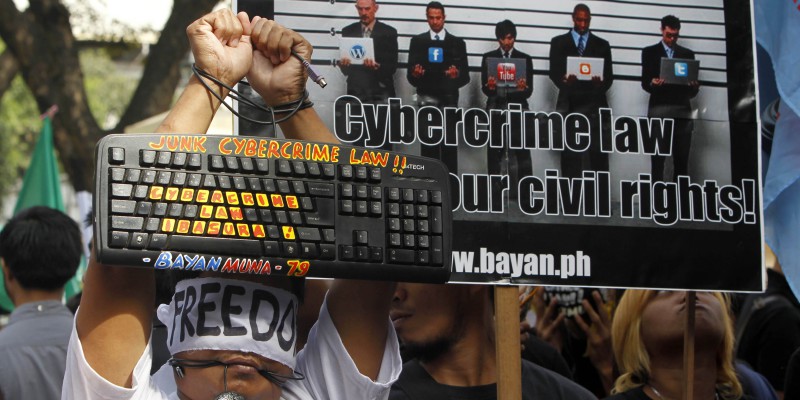Purple S. Romero写道,菲律宾新出台的网络犯罪法将给予政府不受限制的权力监控互联网用户,关闭网站并监禁公民。

菲律宾人迅速沉迷于社交媒体。根据社交媒体监视器Semiocas, 菲律宾的Twitter用户排在世界第十大,拥有950万会员。二十七万菲国人民在Facebook上。 批评者说2012年网络犯罪防治法可能会导致新闻审查和违反言论自由,这是一个令人失望的发展.
其中最容易出问题是网络犯罪法的规定,其电子诽谤的惩罚。 据2011年联合国人权委员会, 菲律宾诽谤的刑事制裁非法限制言论自由的权利。 因此,菲律宾法律违背签署的“公民权利和政治权利国际公约”。
根据不同的媒体集团,法律主要刑事化撰写的东西, 创建一个“寒蝉效应” 阻碍表示重要的报告和不同的观点。
然而,网络犯罪法律不只是增强了诽谤罪为严重罪,也加强惩 罚。网络犯罪法第6条指出施加刑罚应高于规定的程度。 根据修订的刑法,诽谤罪惩处的介乎6个月至4年的徒刑。 根据网络犯罪法, 现在的惩处是6至12年。众议院增加网络犯罪的处罚规定条例草案版本被去除但随后由参议院再次引入(菲律宾有一个两院制的立法机构). 公众人士的意见被忽略。
为什么电子诽谤罪会比普通诽谤罪受到更严重的处罚?助理国务卿Geronimo Sy说因为互联网允许信息更快被传播,也覆盖更广泛的范围。一个点击即可破坏一个人的声誉.在1月15日最高法院的口头辩论中,大法官说一个 Twitter用户可以容易地摧毁一个人的声誉,单一的转发能够达到几十万,甚至上百万的追随者。 因此,保护公民声誉是一项重要法律责任。
含糊不清的法律没有清晰地说明谁决定谁为电子诽谤负责。 最特别的是,重新推文或发布Facebook状态是否构成犯罪?反对这项法律收到一定程度上的反对。助理国务卿Geronimo Sy说逮捕每一个人发重新推文是不切实可行的但当局会调查来源.
但是, 其后的发展带来疑问 。
第19条,或“撤除条款” : 政府可以根据表面证据控制信息.
一次辩论通过了上述19条. 在一个单一的全体会议规定什么让内容有害的和造成的危害所以应得审查. 网络犯罪法的批评者指出当局和政府官员也可以标记批评政府的信息作为,“有害内容”.
如果法律被裁定为有效,执法机关无需取得搜查令也可以实时采集互联网交通数据. 根据法律规定,互联网交通数据是指“任何一台电脑的数据以外的通讯内容,包括,但不限于,通信的来源,目的地,路线,时间,日期,大小,持续时间或相关的服务的类型。”
助理国务卿Geronimo Sy说法律有帮助监视恐怖分子嫌疑人的电子邮件和消息,但由于数据的收集是未经许可,将会有滥用的机会。 在1月15日的口头辩论,另一个司法说法律没有明确解释普通公民可以如何检查如果当局真的只是收集交通数据并不是同时寻找电子邮件,信息的内容等等.
最高法院已经停止了政府推行网络犯罪法律。 即便如此,政府控制公开演讲没有减退。 于2012年10月, 反采矿的积极分子加西亚在Facebook上发布集会的信息后被逮捕.警方负责人还 “邀请” 在Facebook上批评当局的人到派出所。但是, 被要求的七人没有来。 警司圣多美和普林西比说,警方只是想提醒他们,他们的诽谤言论应受到惩罚。网络犯罪的法律没有在这些事件中调用 – 现有的诽谤法律足够证明了他们的行动。 现有的诽谤法的恐吓作用使公众难以信任国家不滥用网络犯罪法。
网络犯罪的法律问题已超越该法案本身。 它的弱点是沒有争论和缺乏诚实的研究, 法律缺乏反馈到他们最初立法的目标:法律来防止黑客,网络色情,身份盗窃。
因为起草工作没有透明度和包容性,也有人质疑它被执行时不尊重和遵守正当程序. 在制定法律的过程,公众声音被忽视所以创造了恐惧。人们说,这将造成电子军法管治, 站出来反对当权者的自由被残酷地镇压 。
像就在1986年一样,菲律宾人会争取自己自由发言权利。他们不能被压制发言,无论是在真实与在虚拟世界上。
Purple S. Romero 是一个马尼拉Rappler.com 多媒体记者.























reply report Report comment
We are three high school students in eleventh grade taking a course called “Language and Literature;” in this course explore taboo and hate speech. We were asked to read a discussion article on “www.freespeechdebate.com,” and this discussion intrigued us the most
What we understood of your argument was that you are antagonistic towards the Philippine’s new Cybercrime Prevention act of 2012; that the Philippines’ government is given unrestrained powers in order to detect internet users. Section 6 of the new Cybercrime Prevention Act, the consequence of libel can result in imprisonment of between six and twelve years, while before it was six months and four years. We agree that six months to four years is far too strict of a punishment. Even though, in the Philippines freedom of speech has allowed, the citizens have no say in the laws. There is no consensus in the Cybercrime Prevention Act in the Philippines with the people and the government.
The ‘Cybercrime Prevention Act of 2012’ is mainly about treating all cyber crimes on the same level. For example the way pornography is treated is the same for one single twitter user posting against the government or authority. On January 15th of 2013, the Supreme Court stated that twitter users can easily destroy the reputation of any individual, and that those individuals should be punished. Geronimo Sy from the Department of Justice states otherwise, that it would be most likely impossible to track down single individuals who are out to harm. Agreeing to this, we believe in freedom of speech. Freedom of speech was given to Filipinos only twenty-eight years ago. This makes it look like taking away freedom of speech on the internet would be a substandard idea.
As of our opinion toward how the Philippine government on how they are trying to solve the internet usage, we believe that the government is approaching the situation in the wrong way. In comparison to Europe, new tough cyber laws have been passed by the EU ruling that hackers and cyber attackers will face at least two years of prison in the future. This generally sounds less serious than the punishments in the Philippines, but the EU dedicates research to investigate major attacks and to correctly punish cybercrime, individuals or groups so they are given the correct punishment and their imprisonment depends on the seriousness and damage of the crime. Five year imprisonments are given to attacks to “critical infrastructure,” such as power plants, transport networks and government networks, and the same applies if an attack is committed by a criminal organisation.
We understand your strong opinion towards the Filipino laws on cyber crime, but the country we live in (The Netherlands) is known for its tolerance in free speech, however it also has an organization and laws about this topic. For instance, Dutch minister of security and justice Ivo Opstellen proposed empowering Dutch law enforcement to access and control the computers of suspected cyber criminals, even if those computers are outside of the Netherlands. The “Nationaal Cyber Security Centrum” has a few responsibility to continuously watch suspect sources on the internet and warn them if they commit a crime. They also organize advertisements on how to protect yourself from digital dangers.
In comparison to The Philippines, The Netherlands, cybercrime is addressed differently and perceived less strictly.
The point that we are trying to make is that it is vague and unclear how the Filipino government and police are identifying what a cybercrime is and what can be considered “criticizing” on the internet.